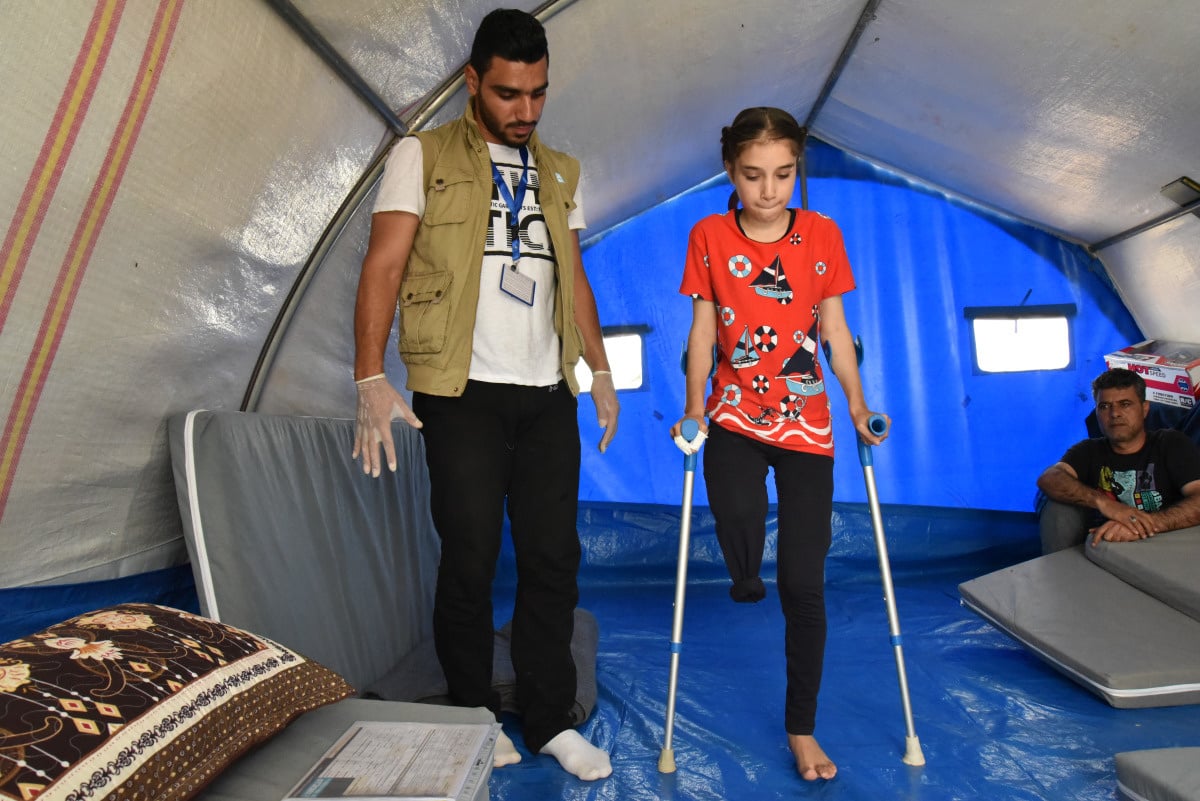“Our life is like a drama film”
Shahed, 12, is from Mosul. On 9 March 2017, she and her family were caught in the middle of fierce fighting. Shahed was seriously injured and doctors amputated her leg. She now lives with her father, brothers and sisters in Khazer displaced people’s camp, in Iraq. One of Handicap International’s teams is providing her with physiotherapy care and psychological support.

Shahed in her tent in Khazer camp. | © E. Fourt / Handicap International
Shahed is sitting on a mattress on the floor and waiting patiently for Mohamed. Handicap International’s physiotherapist began visiting the teenager a few days ago, in the tent she shares with her father, brothers and sisters in Khazer camp. Mohamed arrives and begins another rehabilitation session with Shahed. The teenager’s father, Firas, urges her on as she completes her physiotherapy exercises. Shahed gets up and tries to keep her balance. With Mohamed’s help, she is learning to stand again. It’s the first time since her accident that she manages to get up by herself. Two and a half months ago, she was seriously injured in Mosul as she and her family attempted to escape the city. Her mother and brother died the same day
“It was the 9th of March,” says Firas. “The army arrived in our neighbourhood early in the morning. We’d been living in the cellar of our home for months, sheltering from the bombs. But the bombing was so heavy on that day, that we decided to try and flee, despite the risk to our lives. At first, we went from house to house to avoid the street fighting. But we ended up in a house packed with improvised explosive devices and we had to go back the way we came. The only escape route was outside. At some point, the bombing got much worse and the women and children started screaming and hid behind the cars parked on either side of the street. One of the cars was booby-trapped.”
“Still traumatised”
Shahed closes her eyes. Before continuing with his story, Firas waits as his daughter finishes her physiotherapy exercises and asks her to go play with her brothers and sisters outside the tent. “She is still completely traumatised by what happened to us,” he says, lowering his eyes. Shahed’s grandmother then starts to cry and gets up to also leave the family’s tent. Firas then describes the force of the blast, and how he saw his eldest son killed right in front of his eyes. He recalls the sense of desolation he felt when, trapped between bursts of gunfire, he realised that he might not be able to save all of his children. Because of the chaos, he will have waited two weeks before he was able to find out if Shahed was still alive and where she was. And another two weeks before he was reunited with his younger son, his body riddled with shrapnel wounds. “It felt like an Indian film, with endless plot twists. This is the tragedy of the Iraqi people - our lives are like a drama film,” he says.
“The physiotherapy sessions are vital for Shahed,” explains Mohammed. “But the psychological support we can give her is just as important. She can’t get back on her feet unless she’s feeling better mentally, and she can’t recover psychologically until she can move around again. That’s why the support from my colleague, a psychologist, is so important in situations like these. We work hand-in-hand and do everything we can to ensure the well-being of Shahed and her family.”
The teenager comes back into the tent on the crutches given to her by Handicap International. She sits shyly next to her father. “What sort of life are we living here, in Khazer?” asks Firas as he gives his daughter a hug. “My daughter doesn’t find it easy to move around the camp. It’s not adapted to her condition. My greatest wish now is to leave Iraq and apply for asylum abroad. It doesn’t matter which country, I just want to leave. I can’t erase the past. But I have to move forward. For the sake of my children’s future.”
 Shahed doing her rehabilitation exercises with Mohamad in Khazer camp. © T. Mayer / Handicap International
Shahed doing her rehabilitation exercises with Mohamad in Khazer camp. © T. Mayer / Handicap International




